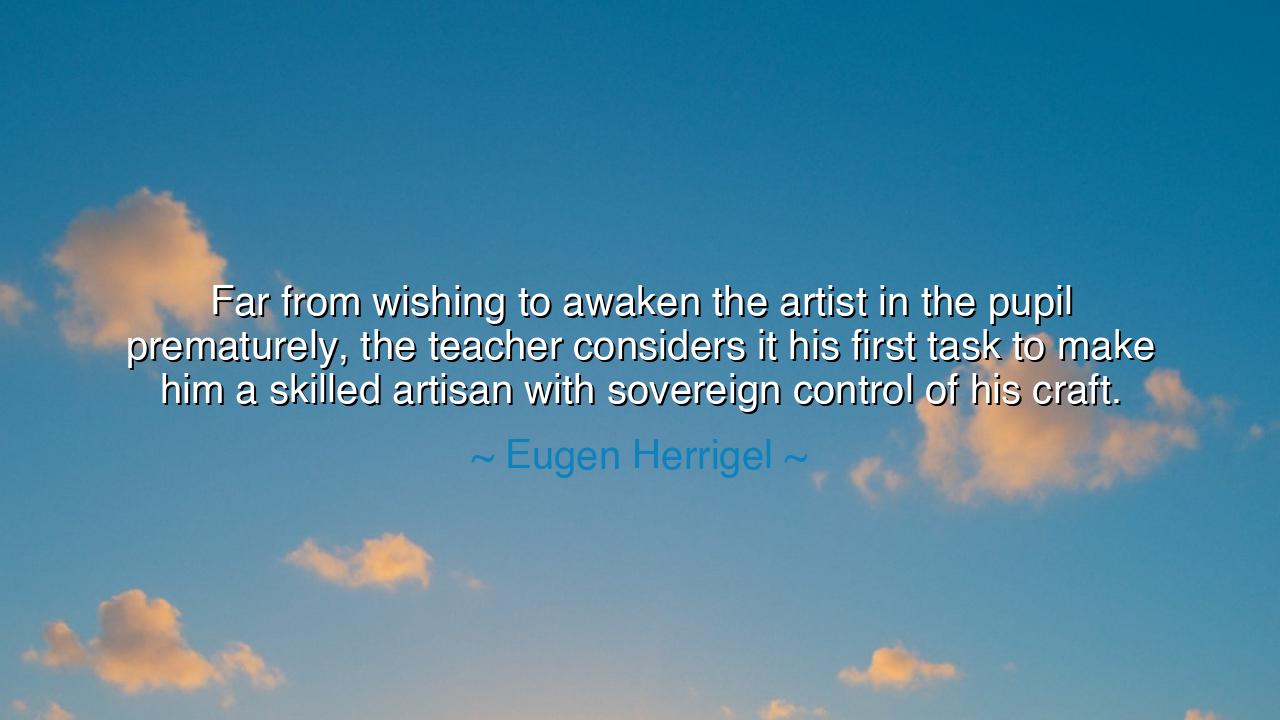
Far from wishing to awaken the artist in the pupil prematurely
Far from wishing to awaken the artist in the pupil prematurely, the teacher considers it his first task to make him a skilled artisan with sovereign control of his craft.






“Far from wishing to awaken the artist in the pupil prematurely, the teacher considers it his first task to make him a skilled artisan with sovereign control of his craft.” Thus spoke Eugen Herrigel, philosopher and seeker, whose years in Japan brought him into contact with Zen masters and the discipline of archery. In these words lies the wisdom of the ancients: that true artistry is not born in haste, nor from mere inspiration, but from mastery of craft—from long labor, patient practice, and the humbling submission of the self to discipline.
The meaning of this saying is clear: before a student may become an artist, they must first become an artisan. The artisan is one who learns the tools, the techniques, the forms, and the laws of their chosen path. Their hands become steady, their motions precise, their mind focused. Only then can the spirit of the artist awaken and soar freely, because it rests upon the firm foundation of skill. To awaken the artist too soon is to invite arrogance, chaos, and shallow expression; to train the artisan first is to prepare a vessel strong enough to contain the fire of inspiration.
Consider the way of the samurai archer in Herrigel’s own Zen in the Art of Archery. The master does not speak of art or beauty at the beginning. He speaks only of the bow, the breath, the posture, the release. The pupil draws and fails, draws and fails again, not in pursuit of artistry, but of mastery over body and mind. Only after years of repetition, when the act becomes natural, does the shot become art. Here we see the truth of Herrigel’s words: that art is the flowering, but craft is the root.
History offers us shining mirrors of this wisdom. Michelangelo, before painting the Sistine Chapel, spent years apprenticed in workshops, grinding pigments, carving marble, mastering geometry and anatomy. Had he sought to awaken the “artist” within himself too soon, his genius would have flared without substance, and faded. But by first becoming a skilled artisan, he gained sovereign control of brush and chisel. Thus, when inspiration descended, his hands were ready to obey. The divine visions that burned in his soul could take form upon stone and plaster because he had built the craft to contain them.
The origin of this teaching is older still. In every ancient guild, whether of blacksmiths, masons, or musicians, the apprentice first endured long years of simple labor. The smith’s apprentice carried coal before forging a sword, the mason cut stone before raising a cathedral, the musician played scales before attempting song. Only when the foundations of discipline and control were secure did the masters allow creativity to blossom. Herrigel, steeped in Zen discipline, gave voice to this universal law: artistry without craftsmanship is hollow, but craftsmanship ripened becomes art.
The lesson for us is timeless: do not seek shortcuts to greatness. Do not hurry to be called “artist” or “master” before you have built the patient strength of the artisan. Embrace repetition, embrace discipline, embrace the humility of learning the basics again and again. For it is in the forge of discipline that the spirit is made steady. Only then will the flame of inspiration, when it comes, find a worthy vessel.
Therefore, dear listener, remember Herrigel’s wisdom: the teacher’s first task is not to feed pride, but to train discipline. And the pupil’s first task is not to chase brilliance, but to bow before craft. If you wish to write, master words; if you wish to paint, master line and color; if you wish to live nobly, master patience, truth, and humility. For when skill becomes sovereign, the artist will awaken of itself—and then your work will not be fleeting, but eternal.






AAdministratorAdministrator
Welcome, honored guests. Please leave a comment, we will respond soon